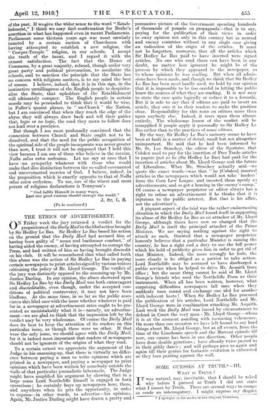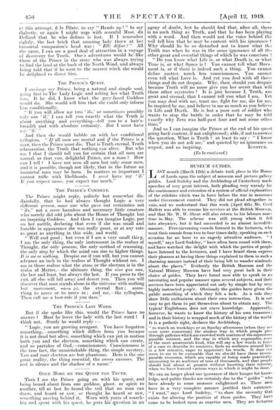SOME GUESSES AT TRUTIL*—HI.
WHAT 18 TRUTH ?
T T was natural, nay, inevitable, that I should he asked I_ why before I guessed at Truth I did not state what I meant by Truth. There are several ways to escape so crude an interrogatory. I might express my disgust
• 7 apologize to the shadet or two eloquent Victorians.
at this attempt, a la Pilate, to cry " Hands up ! " to my dialectic; or again I might urge with scornful Mme. du Deffand that he who defines is lost. If I remember rightly, the last brick that amazing lady threw at her immortal companion's head was : " Elle define ! " All the same, I can see a good deal of attraction in a voyage of discovery for Truth. One's adventures would be like those of the Prince in the story who was always trying to find the land at the back of the North Wind, and always being told that if he went to the nearest witch she would be delighted to direct him.
THE PRINCE'S QUEST.
I envisage my Prince, being a natural and simple soul, going first to The Lady Logic and asking her what Truth was. If he did, I know what the grey-faced Goddess would do. She would tell him that she could only inform him conditionally. If you will allow me two ifs,' or sometimes possibly only one ` if,' I can tell you exactly what the Truth is about anything and everything—tell you to a hair's- breadth and with absolute certainty. But I must have my if.' "
And then she would babble on with her conditional syllogism. " If all men are mortal and if the Prince is a man, then the Prince must die. That is Truth eternal, Truth adamantine, the Truth that nothing can alter. But who am I that I should tell you for certain that all men are mortal, or that you, delightful Prince, are a man ? How can I tell ? I have not seen all men but only some men, and it is possible, though not likely, that in the future an immortal man may be born. In matters so important I cannot trifle with likelihoods. I must have my if.' If you expect more, you expect too much."
THE PRINCE'S COMMENT.
The Prince might reply, politely but somewhat dis- dainfully, that he had always thought Logic a very different person, some one who gave out certainties not ifs," not a mere harmless and necessary little creature who merely did odd jobs about the House of Thought but an inspiring Goddess. And then I can imagine Logic, put on her mettle, declaring that even if she was small and humble in appearance she was really great, or at any rate as great as anything in this wide, sad world.
" Well and good ; but even if I am a very small thirg, I am the only thing, the only instrument in the realms of Thought, the only process, the only method of reasoning, the only step by which the mind can rise to higher things. It is me or nothing. Despise me if you will, but you cannot advance an inch in the realms of Thought without me. I am in those realms what the atom or the electron is in the realm of Matter,--the ultimate thing, the smite qua non, the last and least, but always the last. If you press to the end, all else will fall away and desert you. Then you will discover that man stands alone in the universe with nothing but movement, rd.= ;mi., the eternal flux ; some- thing to move or to move in ; and me,—the syllogism. Then call me a foot-rule if you dare."
THE PRINCE'S LAST WORD.
But if she spoke like this, would the Prince have no answer ? Must he leave the lady with the last word ? I think not. Surely he would reply :—
" Logic, you are growing arrogant. You have forgotten something,—something which differs from you because it is not dead but alive, something which can put in motion both you and the electron, something which can create, and so partakes of God,—consciousness. Consciousness is the true fact, the unmistakable thing, the simple mystery. You and your electron are but phantoms. Here is the one great reality, the thing essential, the cause causans. The rest is silence and the shadow of a name."
ONCE MORE ON THE QUEST FOR TRUTH.
Then I see the Prince going on with his quest, and being boxed about from one goddess, ghost, or spirit to another, till at last he found the veil that no man can draw, and heard or saw, or thought he heard or saw, something moving behind it. Worn with years of search- ing and spent with his quest, he puts his question in an
agony of doubt, lest he should find that, after all, there is no such thing as Truth, and that he has been playing with a word. And then would not the voice behind the veil tell him that he may be content with his ignorance ? Why should he be so disturbed not to know what the Truth was when he was in the same ignorance of all the other great and essential things of which he was conscious ? " Do you know what Life is, or what Death is, or what Time is, or what Space is ? You cannot tell -what Move- ment is, or if there is indeed such a thing. You cannot define matter, much less consciousness. You cannot even tell what Love is. And vet vou deal with all these things and do not despair. Why, then, should you despair because Truth will no more give you her secret than will these other mysteries ? It is just because I, Truth, ant great and eternal, that I cannot tell you what I am. Yet you may deal with me, trust me, fight for me, die for me, be inspired by me, and believe in me as much as you believe in Life and Death. He is but a poor sort of soldier who wants to stop the battle in order that he may be told exactly why Zero was half-past four and not some other time."
And so I can imagine the Prince at the end of his quest going back content, if not enlightened ; able, if not to answer the question, What is Truth ? at least to say : " I know when you do not ask me," and quieted by an ignorance so august, and so inspiring. IGNOTUS.
(To be continued.)




































 Previous page
Previous page